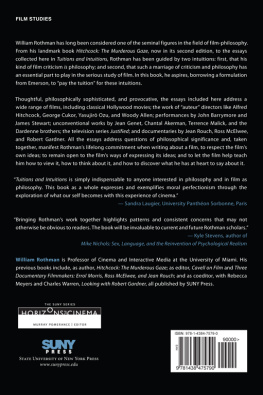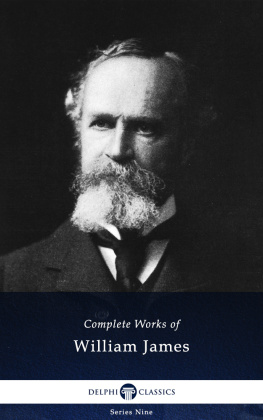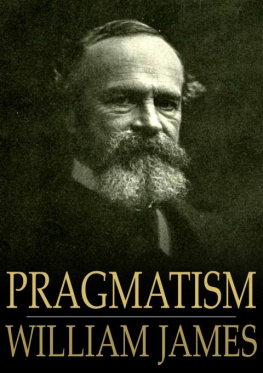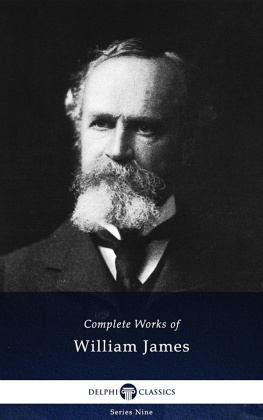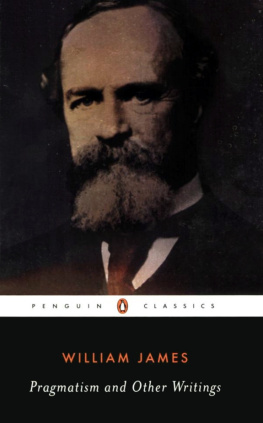James William - The Will to Believe and Other Essays in Popular Philosophy
Here you can read online James William - The Will to Believe and Other Essays in Popular Philosophy full text of the book (entire story) in english for free. Download pdf and epub, get meaning, cover and reviews about this ebook. genre: Science. Description of the work, (preface) as well as reviews are available. Best literature library LitArk.com created for fans of good reading and offers a wide selection of genres:
Romance novel
Science fiction
Adventure
Detective
Science
History
Home and family
Prose
Art
Politics
Computer
Non-fiction
Religion
Business
Children
Humor
Choose a favorite category and find really read worthwhile books. Enjoy immersion in the world of imagination, feel the emotions of the characters or learn something new for yourself, make an fascinating discovery.
- Book:The Will to Believe and Other Essays in Popular Philosophy
- Author:
- Genre:
- Rating:3 / 5
- Favourites:Add to favourites
- Your mark:
- 60
- 1
- 2
- 3
- 4
- 5
The Will to Believe and Other Essays in Popular Philosophy: summary, description and annotation
We offer to read an annotation, description, summary or preface (depends on what the author of the book "The Will to Believe and Other Essays in Popular Philosophy" wrote himself). If you haven't found the necessary information about the book — write in the comments, we will try to find it.
The Will to Believe and Other Essays in Popular Philosophy — read online for free the complete book (whole text) full work
Below is the text of the book, divided by pages. System saving the place of the last page read, allows you to conveniently read the book "The Will to Believe and Other Essays in Popular Philosophy" online for free, without having to search again every time where you left off. Put a bookmark, and you can go to the page where you finished reading at any time.
Font size:
Interval:
Bookmark:
The Project Gutenberg EBook of The Will to Believe, by William James
This eBook is for the use of anyone anywhere at no cost and with
almost no restrictions whatsoever. You may copy it, give it away or
re-use it under the terms of the Project Gutenberg License included
with this eBook or online at www.gutenberg.net
Title: The Will to Believe
and Other Essays in Popular Philosophy
Author: William James
Release Date: May 8, 2009 [EBook #26659]
Language: English
*** START OF THIS PROJECT GUTENBERG EBOOK THE WILL TO BELIEVE ***
Produced by Al Haines. (This file was produced from images
generously made available by The Internet Archive.)
POPULAR PHILOSOPHY
LONDON, BOMBAY, AND CALCUTTA
1912
BY WILLIAM JAMES
Reprinted, May, 1897, September, 1897,
March, 1898, August, 1899, June, 1902,
January, 1903, May, 1904, June, 1905,
March, 1907, April, 1908,
September, 1909, December, 1910,
November, 1911, November, 1912
My Old Friend,
CHARLES SANDERS PEIRCE,
To whose philosophic comradeship in old times
and to whose writings in more recent years
I owe more incitement and help than
I can express or repay.
At most of our American Colleges there are Clubs formed by the students devoted to particular branches of learning; and these clubs have the laudable custom of inviting once or twice a year some maturer scholar to address them, the occasion often being made a public one. I have from time to time accepted such invitations, and afterwards had my discourse printed in one or other of the Reviews. It has seemed to me that these addresses might now be worthy of collection in a volume, as they shed explanatory light upon each other, and taken together express a tolerably definite philosophic attitude in a very untechnical way.
Were I obliged to give a short name to the attitude in question, I should call it that of radical empiricism, in spite of the fact that such brief nicknames are nowhere more misleading than in philosophy. I say 'empiricism,' because it is contented to regard its most assured conclusions concerning matters of fact as hypotheses liable to modification in the course of future experience; and I say 'radical,' because it treats the doctrine of monism itself as an hypothesis, and, ]
This is pluralism, somewhat rhapsodically expressed. He who takes for his hypothesis the notion that it is the permanent form of the world is what I call a radical empiricist. For him the crudity of experience remains an eternal element thereof. There is no possible point of view from which the world can appear an absolutely single fact. Real possibilities, real indeterminations, real beginnings, real ends, real evil, real crises, catastrophes, and escapes, a real God, and a real moral life, just as common-sense conceives these things, may remain in empiricism as conceptions which that philosophy gives up the attempt either to 'overcome' or to reinterpret in monistic form.
Many of my professionally trained confrres will smile at the irrationalism of this view, and at the artlessness of my essays in point of technical form. But they should be taken as illustrations of the radically empiricist attitude rather than as argumentations for its validity. That admits meanwhile of being argued in as technical a shape as any one can desire, and possibly I may be spared to do later a share of that work. Meanwhile these essays seem to light up with a certain dramatic reality the attitude itself, and make it visible alongside of the higher and lower dogmatisms between which in the pages of philosophic history it has generally remained eclipsed from sight.
The first four essays are largely concerned with defending the legitimacy of religious faith. To some rationalizing readers such advocacy will seem a sad misuse of one's professional position. Mankind, they will say, is only too prone to follow faith unreasoningly, and needs no preaching nor encouragement in that direction. I quite agree that what mankind at large most lacks is criticism and caution, not faith. Its cardinal weakness is to let belief follow recklessly upon lively conception, especially when the conception has instinctive liking at its back. I admit, then, that were I addressing the Salvation Army or a miscellaneous popular crowd it would be a misuse of opportunity to preach the liberty of believing as I have in these pages preached it. What such audiences most need is that their faiths should be broken up and ventilated, that the northwest wind of science should get into them and blow their sickliness and barbarism away. But academic audiences, fed already on science, have a very different need. Paralysis of their native capacity for faith and timorous abulia in the religious field are their special forms of mental weakness, brought about by the notion, carefully instilled, that there is something called scientific evidence by waiting upon which they shall escape all danger of shipwreck in regard to truth. But there is really no scientific or other method by which men can steer safely between the opposite dangers of believing too little or of believing too much. To face such dangers is apparently our duty, and to hit the right channel between them is the measure of our wisdom as men. It does not follow, because recklessness may be a vice in soldiers, that courage ought never to be preached to them. What should be preached is courage weighted with responsibility,such courage as the Nelsons and Washingtons never failed to show after they had taken everything into account that might tell against their success, and made every provision to minimize disaster in case they met defeat. I do not think that any one can accuse me of preaching reckless faith. I have preached the right of the individual to indulge his personal faith at his personal risk. I have discussed the kinds of risk; I have contended that none of us escape all of them; and I have only pleaded that it is better to face them open-eyed than to act as if we did not know them to be there.
After all, though, you will say, Why such an ado about a matter concerning which, however we may theoretically differ, we all practically agree? In this age of toleration, no scientist will ever try actively to interfere with our religious faith, provided we enjoy it quietly with our friends and do not make a public nuisance of it in the market-place. But it is just on this matter of the market-place that I think the utility of such essays as mine may turn. If religious hypotheses about the universe be in order at all, then the active faiths of individuals in them, freely expressing themselves in life, are the experimental tests by which they are verified, and the only means by which their truth or falsehood can be wrought out. The truest scientific hypothesis is that which, as we say, 'works' best; and it can be no otherwise with religious hypotheses. Religious history proves that one hypothesis after another has worked ill, has crumbled at contact with a widening knowledge of the world, and has lapsed from the minds of men. Some articles of faith, however, have maintained themselves through every vicissitude, and possess even more vitality to-day than ever before: it is for the 'science of religions' to tell us just which hypotheses these are. Meanwhile the freest competition of the various faiths with one another, and their openest application to life by their several champions, are the most favorable conditions under which the survival of the fittest can proceed. They ought therefore not to lie hid each under its bushel, indulged-in quietly with friends. They ought to live in publicity, vying with each other; and it seems to me that (the rgime of tolerance once granted, and a fair field shown) the scientist has nothing to fear for his own interests from the liveliest possible state of fermentation in the religious world of his time. Those faiths will best stand the test which adopt also his hypotheses, and make them integral elements of their own. He should welcome therefore every species of religious agitation and discussion, so long as he is willing to allow that some religious hypothesis
Font size:
Interval:
Bookmark:
Similar books «The Will to Believe and Other Essays in Popular Philosophy»
Look at similar books to The Will to Believe and Other Essays in Popular Philosophy. We have selected literature similar in name and meaning in the hope of providing readers with more options to find new, interesting, not yet read works.
Discussion, reviews of the book The Will to Believe and Other Essays in Popular Philosophy and just readers' own opinions. Leave your comments, write what you think about the work, its meaning or the main characters. Specify what exactly you liked and what you didn't like, and why you think so.








